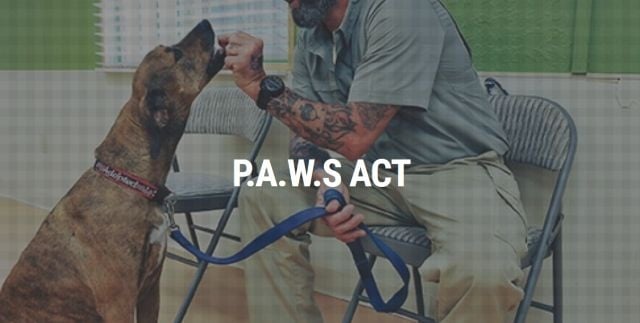Virginia Senator announces support for the PAWS Act

On Friday, Senator Tim Kaine announced his support for new legislation to help veterans suffering from Post-Traumatic Stress Disorder by using service dogs.
Kaine is a member of the Senate Foreign Relations and Armed Services Committees, and the bill is known as the Puppies Assisting Wounded Service members Act. This act reportedly involves innovative treatment methods to improve these service members quality of life, and was originally introduced by Senators Deb Fischer and Corey Booker.
Kaine was quoted saying, “We owe each and every veteran a debt of gratitude for the sacrifices they made on and off of the battlefield. Many come home with injuries that are unseen, such as PTSD which affects a significant percentage of veterans who have returned from the wars in Iraq and Afghanistan. A service dog can provide loyalty and emotional support to help our veterans cope with the scars they return with. I’m proud to join this bipartisan effort.”
Research has indicated that PTSD is difficult to treat, and many veterans do not seek or continue treatment. The US Department of Veterans Affairs estimates that between 11 and 20 percent of veterans who served in Iraq and Afghanistan have PTSD in a given year.
So, with this act, service dogs will be thought to provide several identified benefits to people suffering from PTSD or other combat-related illnesses. Studies have shown that animal-assisted therapy for trauma may lead to a reduction in PTSD symptoms, as well as reduced depression, anxiety, and dissociation symptoms. This therapy is also thought to lead to better sleep quality and lessen the need for medication.
What many people do not know is that the VA does provide service dogs for physically disabled veterans, but it does not provide service dogs for veterans living with PTSD. So, the PAWS Act directs the VA to implement a five-year pilot program to provide service dogs, from certified providers, as well as veterinary insurance to those veterans who both served on active duty on or after September 11, 2001, and were diagnosed with, and continue to suffer from, PTSD. The veterans who are paired with dogs would then receive follow-up support service, from the certified service dog provider, for the rest of the dog’s life.
Officials say that in order to remain eligible for the program, veterans must see a primary care or mental health care provider at least quarterly at a VA medical facility.
After the pilot program is completed, the Government Accountability Office would conduct a program evaluation and submit a report to Congress.
The House version of the PAWS Act, H.R. 4764, was introduced by Congressman Ron DeSantis in March 2016, and the House bill currently has 97 bipartisan cosponsors and has been referred to the House Committee on Veterans’ Affairs.


